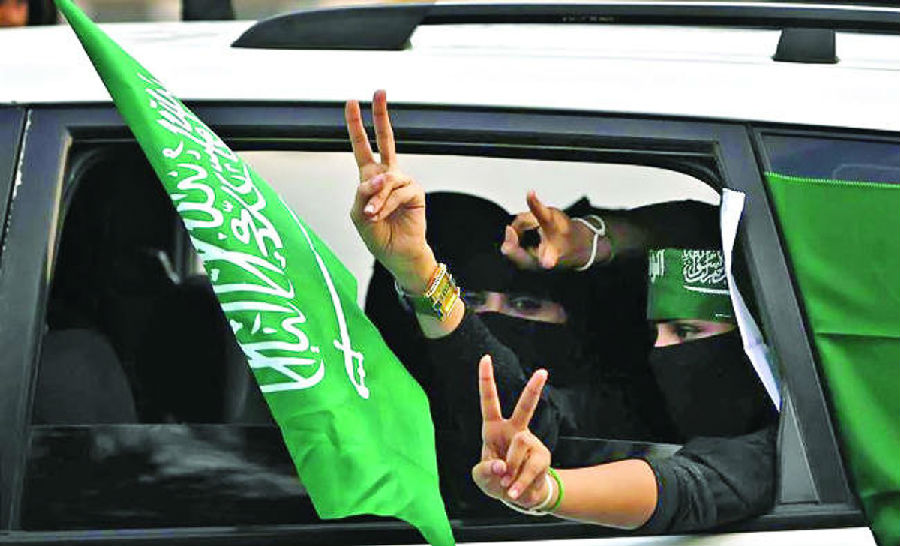JOHN YANG: But first: Saudi Arabia is the only country in the world that forbids women from driving. But this Sunday marks a milestone, when that prohibition ends. Nick Schifrin looks at the state of women's rights in the kingdom and the long and winding road to allow females behind the wheel.
NICK SCHIFRIN: Whenever Manal Al-Sharif drives, she feels free. But in her home in Saudi Arabia, what looks routine has represented resistance.
MANAL AL-SHARIF, Author, "Daring to Drive" (through translator): You will find a woman with a Ph.D., a professor at a college, and she doesn't know how to drive. We want change in this country.
NICK SCHIFRIN: Since the 1950s, Saudi Arabia has banned women from driving. Activists broke barriers and religious custom posting driving videos to YouTube. For women, driving is dignity, Al-Sharif told Jeffrey Brown last year.
MANAL AL-SHARIF: It gives them sense of liberty and freedom. And that breaks all the things that have been learned and brainwashed with, that we are, have to be obedient to these unjust laws, and we're weak.
NICK SCHIFRIN: The protest movement started in the early 1990s.
MAN (singing): No woman, no drive. No woman, no drive.
NICK SCHIFRIN: And even included male comedians spoofing Bob Marley on women needing drivers.
MAN (singing): I remember when you used to sit in the family car, but backseat.
NICK SCHIFRIN: But it's backseat no longer. This month, Saudi women learned the rules of the road from a former race car driver. And a small number of women have already received driver's licenses, as seen in this government-produced video. Female drivers means more female workers, says Saudi embassy spokesperson Fatimah Baeshen.

FATIMAH BAESHEN, Spokesperson, Embassy of Saudi Arabia: Driving was a very tangible barrier for women entering the work force. And so allowing women to drive is really a green light, pun intended, for women to kind of come into the work force and commercially and economically contribute.
NICK SCHIFRIN: The effort's spearheaded by 32-year-old Crown Prince Mohammed bin Salman. In the last few years, women have earned the right to vote and run for office in local elections and attend moves and sports games, part of a larger Vision 2030 plan.
FATIMAH BAESHEN: When we talk about Vision 2030 and transforming the economy and developing the society in a way that really pivots the country's trajectory, it allows kind of normalizing women entering into the public space.
NICK SCHIFRIN: But critics say this seemingly modern U.S. ally is stuck in the past, and using women drivers is a Mohammed bin Salman P.R. stunt to get Western attention and investment, says London School of Economics Professor Madawi Al-Rasheed.
MADAWI AL-RASHEED, London School of Economics: He needs Western capital and Western expertise. And, therefore, putting a soft, beautiful face behind the wheel may just do it for him.
NICK SCHIFRIN: Last month, many of the very women whose activism made the change possible were arrested and accused of undermining Saudi security, part of a larger crackdown on Mohammed bin Salman's critics.
MADAWI AL-RASHEED: Poets, journalists, intellectuals, lawyers, professionals, almost, and even his own cousins and his own relatives, they had a taste of his repression.
NICK SCHIFRIN: And what's not changing this weekend: Saudi women still need a male guardian's permission to travel, get married, even open a bank account. This society is still restrictive and still has no representative government.
MADAWI AL-RASHEED: To think that Saudi Arabia is going to be reformed without political change is actually a myth. It's not gonna happen. Women's rights are part of a bundle of rights, and these rights are political rights.
NICK SCHIFRIN: In response for her activism, Manal Al-Sharif was jailed and labeled a prostitute. But she's still working to change Saudi society.
MANAL AL-SHARIF: Speaking up, I have never regretted that, because if I didn't speak up, I would lose myself.
NICK SCHIFRIN: Lifting the driving ban will provide Saudi women unprecedented autonomy, but activists say the road to freedom is still blocked. For the "PBS NewsHour," I'm Nick Schifrin.












